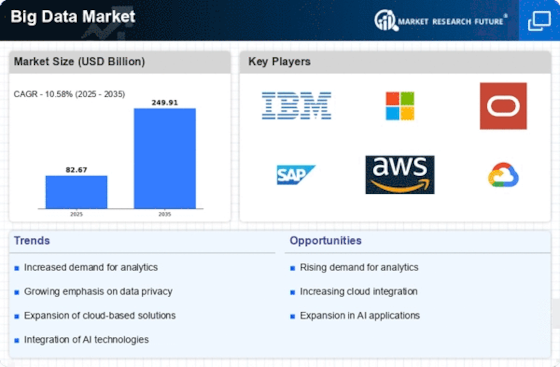Top Industry Leaders in the Big Data Market

Competitive Landscape of the Big Data Market:
The big data market is a dynamic and rapidly evolving landscape, driven by the ever-increasing volume, velocity, and variety of data generated in our digital world. This data presents immense opportunities for businesses across industries to gain insights, optimize operations, and drive innovation. As a result, the market has attracted a diverse range of established players and nimble startups vying for dominance.
Key Players:
- Fair Isaac Corporation
- Accenture PLC
- Cloudera Inc.
- Teradata Corporation
- Microsoft Corporation
- Splunk Inc.
- Amazon Web Services
- Cisco Systems Inc.
- Hewlett Packard Enterprise Company
- Tableau Software
- SAP SE
- Hitachi Ltd.
- Oracle Corporation
- Dell Technologies
- IBM Corporation
Factors for Market Share Analysis:
- Product Portfolio Breadth: Companies with a comprehensive range of big data solutions across the value chain (data storage, ingestion, processing, analysis, and visualization) hold an advantage.
- Technology Innovation: Continuous investment in research and development of cutting-edge solutions like AI, machine learning, and predictive analytics is crucial for staying ahead of the curve.
- Industry Focus: Specialization in specific industry verticals like healthcare, finance, or retail allows companies to cater to niche needs and build deeper customer relationships.
- Pricing and Licensing Models: Offering flexible pricing models and subscription options can attract cost-conscious customers and scale market reach.
- Partnerships and Acquisitions: Strategic partnerships with complementary players and targeted acquisitions can expand product offerings and market presence.
New and Emerging Companies:
- Open-Source Players: Apache Spark, Hadoop, and Kafka are gaining traction due to their flexibility, scalability, and cost-effectiveness. These platforms empower smaller players and foster innovation.
- AI and Machine Learning Startups: Companies like Databricks, Palantir, and C3.ai are pushing the boundaries of data analysis with advanced AI and machine learning capabilities, unlocking new insights and applications.
- Cloud-Native Data Solutions: Companies like Snowflake and MongoDB are disrupting traditional data warehousing with their cloud-based, scalable, and pay-as-you-go solutions, attracting cloud-first businesses.
Current Investment Trends:
- Cloud Migration: Big data solutions are increasingly migrating to the cloud, fueled by scalability, accessibility, and cost optimization benefits. Companies are investing in cloud-native platforms and partnerships with major cloud providers.
- AI and Machine Learning Integration: The integration of AI and machine learning into big data platforms is driving deeper insights and automation. Companies are investing in AI-powered data pipelines, predictive analytics, and automated insights generation.
- Security and Privacy: Data security and privacy concerns are paramount, and companies are investing in robust security solutions and compliant data governance practices.
- ** democratization of Data:** The need for wider access and utilization of data is driving investment in self-service analytics tools and user-friendly interfaces, empowering non-technical users to leverage data insights.
- Verticalization and Niche Solutions: Companies are focusing on developing specialized solutions catering to the unique needs of specific industries, creating a more tailored and efficient market landscape.
Latest Company Updates:
Nielsen Opens Big Data For Trading in 2023 Without Providing Mr. C. Accreditation Or Clarifying Certain of Its Numbers. The launch coincides with MRC audit meetings ahead of schedule, and without Nielsen disclosing results that might significantly affect the ratings of other programming on some Spanish-language networks.
Cloudera Inc., a big data firm, is facilitating the migration of enterprise data analytics to the cloud in 2022 by introducing Cloudera Data Platform One, a new software-as-a-service-based data lakehouse product. With today's announcement, CDP One is intended to provide quick, self-service analytics and exploratory data science on any type of cloud data. To allow safe, sophisticated analytics workloads, it has enterprise-grade security and machine learning integrated right in.










